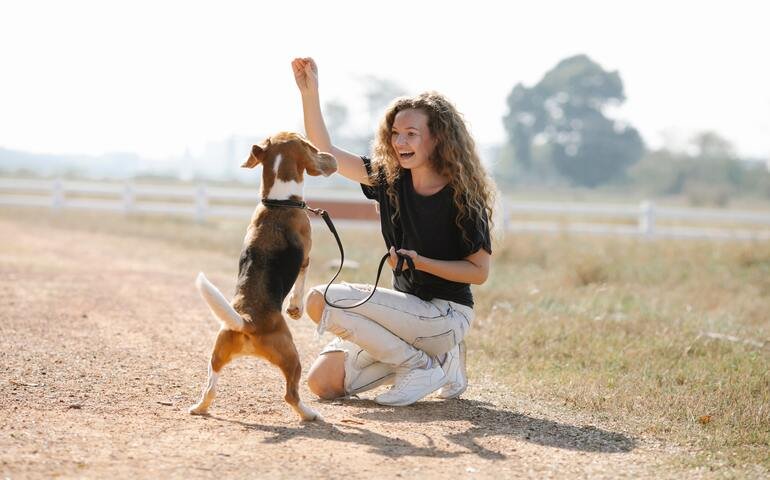The Guide Dog Trainer Level 3 Advanced Diploma equips students with the knowledge and skills to train guide dogs and support individuals with visual impairments. Topics covered include advanced training techniques, canine behaviour, nutrition and health, business and management, and ethics. By course completion, students will be proficient in training guide dogs, understanding canine behaviour, ensuring dog health, possessing business skills, and upholding professional standards. This course enables individuals to positively impact the lives of visually impaired individuals by providing well-trained guide dogs and essential support.
Overview
The Guide Dog Trainer Level 3 Advanced Diploma is a comprehensive course designed to equip students with the knowledge and skills needed to train guide dogs and provide essential support to individuals with visual impairments. Through a series of engaging lectures and practical modules, students will delve into advanced training techniques, canine behaviour and psychology, nutrition and health, business and management skills, as well as ethics and professionalism in the field. The course begins with an exploration of advanced training techniques, where students will learn effective methods to train guide dogs, including obedience training, task-specific training, and advanced commands. They will also understand how to tailor training programs to meet the specific needs of individuals with visual impairments. Canine behaviour and psychology will be extensively covered, providing students with insights into the behaviour patterns, communication signals, and socialization needs of dogs. They will learn how to assess and modify behaviour, address common behavioural issues, and create a positive training environment. Understanding nutrition and health is essential for maintaining the well-being of guide dogs. Students will gain knowledge about proper nutrition, exercise requirements, common health issues, and preventive care measures to ensure the optimal health and longevity of guide dogs. Business and management skills are vital for guide dog trainers. Students will explore topics such as client relationships, record-keeping, marketing strategies, and financial management, enabling them to establish and manage their own guide dog training businesses or contribute effectively to existing organizations. Ethics and professionalism are fundamental aspects of guide dog training. Students will learn about ethical considerations, professional standards, confidentiality, and the importance of maintaining professionalism in their interactions with clients and the community. By the end of this advanced diploma course, students will have developed the expertise to train guide dogs effectively, understand canine behaviour and psychology, ensure proper nutrition and health care, possess business and management skills, and uphold ethical standards in their profession. This course prepares individuals to make a positive impact on the lives of individuals with visual impairments by providing them with highly trained guide dogs and invaluable support.What Will You Learn?
- Advanced training techniques for guide dogs, including obedience training and task-specific training.
- Canine behaviour and psychology, understanding behaviour patterns, communication signals, and socialization needs of dogs.
- Nutrition and health considerations for guide dogs, including proper nutrition, exercise requirements, and common health issues.
- Business and management skills relevant to guide dog training, such as client relationships, record-keeping, marketing strategies, and financial management.
- Ethical considerations and professionalism in the guide dog training field, including maintaining confidentiality and upholding professional standards.
- Tailoring training programs to meet the specific needs of individuals with visual impairments.
- Assessing and modifying canine behaviour, addressing behavioural issues, and creating a positive training environment.
- Establishing and managing a guide dog training business or contributing effectively to existing organizations.
- The importance of maintaining the well-being and optimal health of guide dogs through preventive care measures.
- Developing a strong understanding of the responsibilities and impact of guide dog trainers in supporting individuals with visual impairments.
Who Should Take The Course
- Individuals aspiring to become professional guide dog trainers and work in the field of assistance dog training.
- Dog trainers or behaviourists seeking specialized knowledge and skills in training guide dogs.
- Animal care professionals or veterinary professionals interested in expanding their expertise to include guide dog training.
- Those working or volunteering in organizations related to assistance dogs, such as guide dog schools or assistance dog programs.
- Individuals with a passion for working with animals and a specific interest in training dogs to support individuals with visual impairments.
- Professionals in the disability support sector who want to enhance their understanding of guide dogs and their role in assisting individuals with visual impairments.
- People considering a career change or looking to pursue a fulfilling role in the field of guide dog training.
Requirements
- No specific educational background or prior qualifications are required.
- A genuine interest in guide dog training and a passion for working with animals.
- Good communication and interpersonal skills to effectively interact with clients and team members.
- Physical fitness and the ability to handle and train dogs of varying sizes and breeds.
Course Curriculum
-
- Advanced obedience training techniques 00:21:00
- Advanced guide dog training techniques 00:20:00
- Training dogs with special needs 00:18:00
- Training dogs for specific tasks 00:23:00
- Training guide dogs for people with additional disabilities 00:18:00
-
- Advanced canine behaviour and psychology 00:19:00
- Advanced understanding of dog communication 00:21:00
- Advanced understanding of dog body language 00:25:00
- Working with difficult dogs 00:20:00
- Canine aggression management 00:18:00
- Advanced understanding of canine nutrition 00:21:00
- Advanced understanding of common canine health issues 00:25:00
- Advanced understanding of veterinary care 00:23:00
- The role of nutrition and health in guide dog training 00:20:00
- The importance of exercise and play in guide dog training 00:27:00
- Ethical considerations in guide dog training 00:25:00
- Professional standards and conduct for guide dog trainers 00:27:00
- Working with clients with different cultural backgrounds 00:20:00
- Legal and regulatory issues in guide dog training 00:18:00
- Working with other professionals in the guide dog training industry 00:16:00
- Order Certificate 00:05:00
Course Reviews
5
- 5 stars2
- 4 stars0
- 3 stars0
- 2 stars0
- 1 stars0
New Courses
Blogs
Jul'23
ADHD Training for Teachers: Empowering Educators to Support Students with Attention Challenges
Relationships may be severely harmed by narcissistic behaviours, leaving emotional scars and...
Jul'23
Narcissistic Behaviour and Relationships: Understanding the Impact and Finding Healing
Relationships may be severely harmed by narcissistic behaviours, leaving emotional...
Jul'23
Childhood Trauma in Adults
What Is Childhood Trauma? Childhood trauma refers to distressing or...
Jul'23
Creating A Social Media Strategy
Set Clear Objectives:The first step in developing a successful social media...
Jul'23
Neuro-Linguistic Programming Techniques
Neuro-Linguistic Programming (NLP) is a fascinating and widely acclaimed approach...
Jul'23
Acceptance and Commitment Therapy in the UK
What is acceptance and commitment therapy? Acceptance and Commitment Therapy...






great company
Thats very easily and brilliant